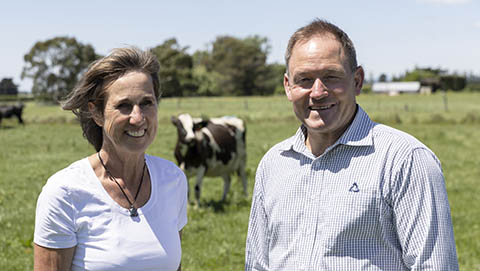Fernside dairy farmer Julie Bradshaw says being involved in Livestock Improvement Corporation’s (LIC’s) Sire Proving Scheme (SPS) for over 20 years has shown her how quality animal data is key to improving the efficiency of her farming operation.
Julie is participating in a farming innovation project which examines how the next generation of farmers are using innovation to improve their farming practices. Waimakariri Landcare Trust (WLT) and Waimakariri Irrigation Limited (WIL) have partnered with the Ministry for Primary Industries (MPI) for the project, with support from MPI’s Sustainable Food and Fibre Futures fund along with Environment Canterbury, Ballance, and DairyNZ.
Alongside the SPS participation, Julie decided to DNA parentage test her entire herd when the technology became available in 2007 and says the test (which uses DNA to match an animal to its parents) has removed the stress from calving season while helping to identify which animals have the best genetic profile for breeding.
“We were asked to join LIC’s Sire Proving Scheme and it’s one of the best decisions we ever made. Making the commitment to DNA test has been of huge benefit as it shows exactly what you have in your herd.
“When it comes time for calving, you’re not running around trying to match all the calves to their dam because you already have your data.”
This season, Julie is focusing on fine-tuning her herd while aiming to achieve the same amount of milk production.
“We went through the herd and looked at the top producing cows. We’ve made sure that these have been properly mated using AI (artificial insemination) to get the most genetic gains through targeting replacements from the higher rated cows.
“Using herd test data and genetic merit analysis we can determine which animals are the most efficient and focus our efforts on these cows. There is no doubt that we will have to reduce our cow numbers and science can help us make the best decisions for the future of our farm.”
LIC general manager of New Zealand markets Malcolm Ellis says that following on from the significant period of cow growth and the eventual cow peak in 2015, the focus is now on the productive efficiency of the individual cow.
“There can be a significant range in productivity within a herd. The difference between good and average cows in any herd is often quite extreme. It isn’t unusual to have a herd that is doing 400 to 450 kilograms of milk solids per cow and having a range in productivity of 160 to 200 kilograms between the top and bottom quartile groups.
“It does provide a significant opportunity to target the top performing cows while not breeding from the poorer quality cows in order to accelerate the rate of genetic gain.”
Malcolm says it’s important for the dairy sector to own the fact that farmers will be milking less cows in the future.
“I don’t think that we should fight this. I see it as an opportunity to embrace and celebrate our best cows and to have more of them.”
The calibre of Julie’s herd was recognised this season, with one of her bull calves being considered for LIC’s Sire Proving Scheme. Although it didn’t make the final cut (only 250 bull calves from across New Zealand are selected each year), Julie was proud to have an animal in the running.
“It has been quite exciting as it’s the first time for us to have one of our animals considered in 25 years of dairy farming.”
Julie says data from genetics helps her make informed decisions which are essential for a successful farming business, especially in the current climate.
“The more information you can gather, the better the decision-making process will be. We can use technology to improve our efficiency and reduce our impact on the environment.
“As a farmer you’ve got to be efficient. This is the way that the world wants us to be and if you are going to future-proof your business you need the data to prove that you are minimising your impact on the planet.”

Fernside dairy farmer Julie Bradshaw with Livestock Improvement Corporation (LIC) general manager of New Zealand markets Malcolm Ellis and one of her cows whose offspring was considered for LIC’s Sire Proving Scheme (SPS) breeding programme.